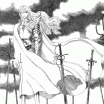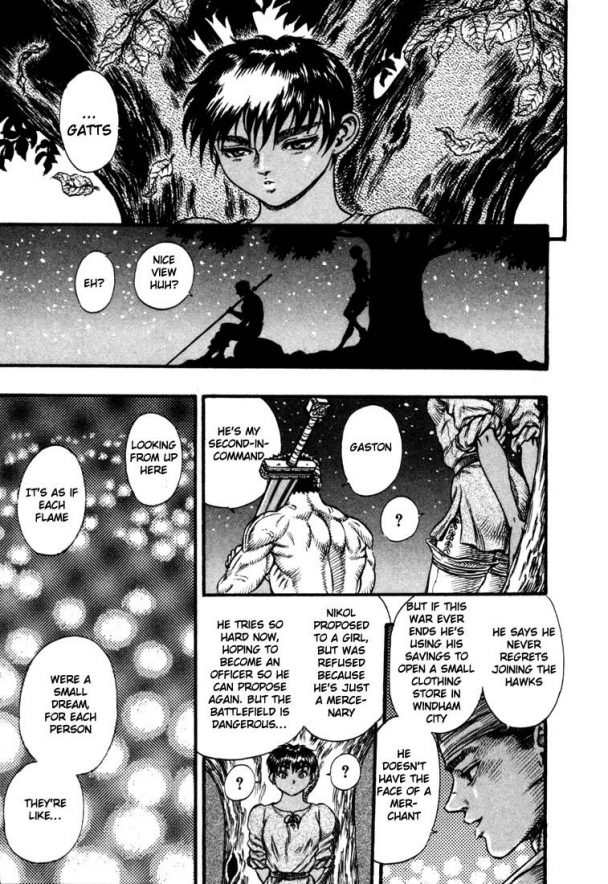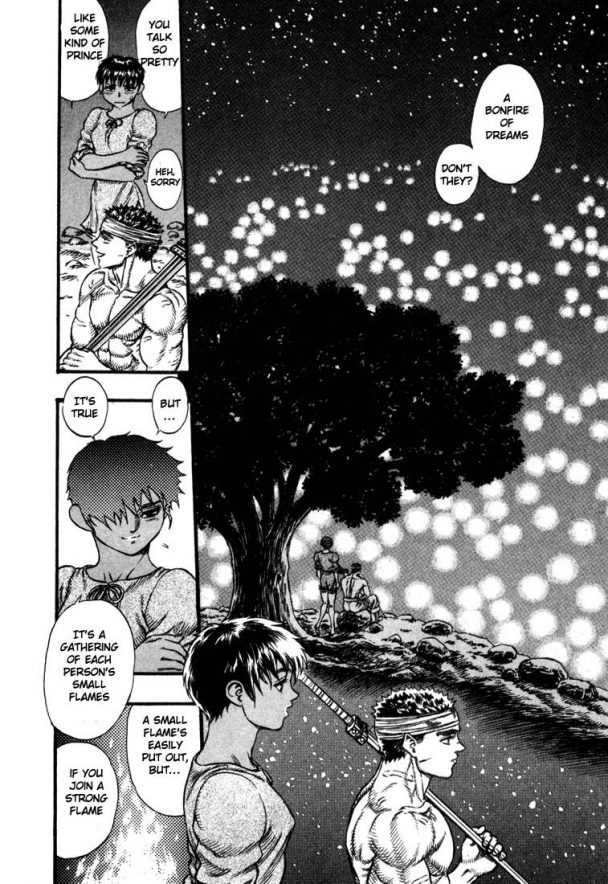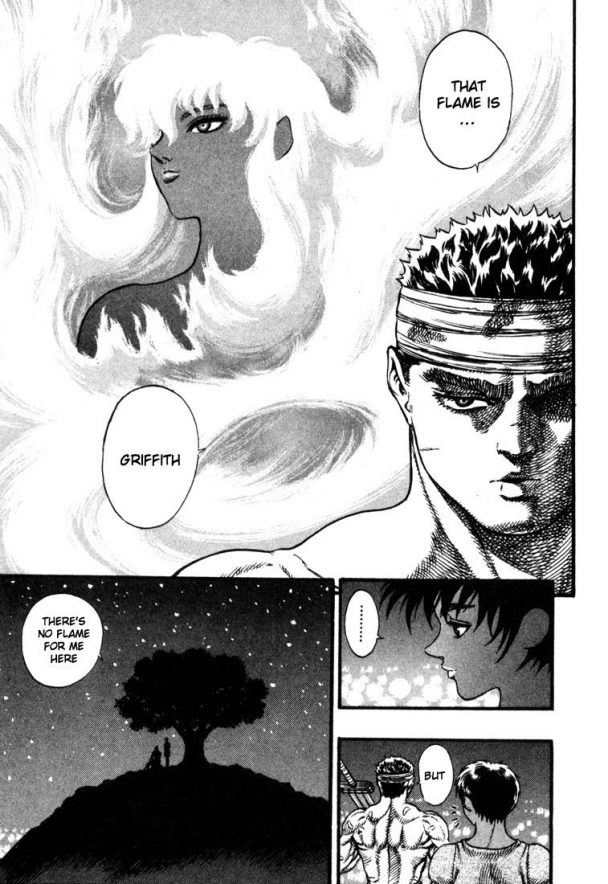Berserk – Philosophy of Griffith, and Fate

In the world of Berserk, Griffith is a legendary hero. He is so charismatic and magnetic that great soldiers flock to him. He is the commander who ended the a century long war. His success was so great that even though he was not born to the nobility, he was knighted and granted lordship. Griffith, though, is as caught up in the whorls of fate as the rest of the world. He is known as the Hawk of Light, not simply a hero, but a hero foretold in Berserk’s equivalent of the Bible. Only a few truly know how Griffith differs from that image.
The Public Face of Griffith
There is little we know about Griffith’s youth. Most of what we know is what the rest of the world sees. He was born outside of nobility, possibly even a street urchin. Even then, he saw a palace above the streets he called home. From this position, at a young age he became determined to win a kingdom of his own. This sounds like Conan the Barbarian, but Griffith is not like Conan.
Griffith is a natural leader in battle. He is cunning both on the field, and navigating politics. Griffith knew his soldiers and exactly what they could do. His battle plans took every variable into account, leading to his band defeating opponents far superior in number or equipment. This is why soldiers offer their services to him. His fire, his drive, is so strong that normal individuals would want to associate with him, and hope to help achieve their own dreams through this.
One of the soldiers, Judeau, said it well when speaking about his own reasons for joining with Griffith:
I’m a jack of all trades… a little better than most at everything, but I don’t shine at anything. […] I realized that I could never be the best, so I decided to find the man that could and serve by his side.
There was one big exception to this. Guts. When Griffith saw Guts fight for the first time, he wanted Guts. He won Guts’ services in a duel with him. Despite the devotion that he earns from his soldiers, Guts was the only one who Griffith gave such individual attention to.

Success, or ‘Fate’
Griffith was so successful in battle, that it often appeared easy. Sure, he worked hard to plan things through, but that does not explain how he ALWAYS runs through his opponents. He ALWAYS suffers minimal casualties. Even the greatest commanders should run into stiff competition somewhere along the way. Griffith, on the other hand, seems to simply be filling a role. The role makes demands on him, but the path is just there.
Here is the biggest example of the costs and demands he faces. At one point, the Band of the Hawk was running short on supplies. In order to keep everyone operational, Griffith sold his body to a noble for an evening. This noble was a depraved man with numerous young boy servants, so you can fill in the blanks there. He confessed this to Caska after the fact, behaving in a way that showed that it had taken a significant emotional toll on him. After that, though, he seemed to brush it off and continue. Later, he even used this against the noble, who was ruling over a fort that Griffith meant to take. Knowing his adversaries as well as he knew his men, he baited the noble’s desire for Griffith and exploited it against him.
That sounds like overcoming great adversity, but it is one example against the much greater trend of Griffith calmly striding to victory after victory. He is just as subject to fate as everyone else in the world of Berserk. In fact, he has a Behelit from the moment we see him. The Behelit is like the One Ring, which finds its own way to be where it wants to be. The Behelit wanted to be with Griffith, meaning that fate expected him to be in a position to sacrifice for his own ambition. He was fated to have the Behelit, and to have his ambition come crashing down on himself.

Ambition
Even though Griffith can come across as a noble character, there are many places where we see the cold, almost inhuman strength of his ambition. While he has the admiration of his troops, it becomes clear at one point that he does see them merely as tools to advance his ambition. He ‘cares’ about them, in that he learns about them, understands them, and keeps them happy and running at their full potential. From the point of view of the soldiers, he is a warm, caring commander, even though he is willing to pile all of their dead bodies on top of each other to climb himself higher. All of this contributes to his battle success.
Even then, Griffith understands that success in battle will win him some respect, and the adoration of the people, but without a noble title he will not have the crown. To keep moving forward, and earn himself nobility, e has orchestrated the assassination of a political rival, has seduced the daughter of the king, defended the king personally, and presented himself as a courtly gentleman.
Once he was given a noble title, he knew that many would plot against him. He put together a plot to have all of his rivals in one place. He locked them into a building and set it on fire, conveniently felling all opposition to his plans. At this point, he saw his goal in front of him. He had won peace for the country, plotted his way to a noble title, killed his political rivals or cowed them to his will, and won the heart of the princess putting himself in the line of succession. Everything had worked to meet his desire.

Downfall and Rebirth
Nearly all situations, Griffith is in complete control. Even with Guts, he seems to have everything perform as he wants. He wanted Guts, and won his service in a duel. After Griffith’s dreams seemed to be realized, though, Guts wasn’t satisfied to simply serve the dream of someone else. He wanted to go out and find his own way. At this point:
Griffith denied him his leave. Guts challenged him to a re-match, quickly defeating Griffith decisively. This is the ONLY time we have seen anything go against Griffith’s wishes.
Griffith was clearly crushed by this. Seemingly to soothe his ego, he climbs into the Princess’s bedroom, and has his way with her. It is shown that she isn’t unwilling, but it wasn’t exactly a loving act of his. He was caught, and imprisoned. His fall from grace was hard, spending the subsequent months in a dungeon, horribly tortured. Tongue cut, and tendons severed, he was left incapable of acting on his own ambitions anymore.
His devoted troops find him and try to rescue him. He is broken, though. He tries to escape, but so crippled, he fails. Here, he finds himself a broken man, ready to kill himself, and the Behelit finds him again. To serve his ambition, he is willing to sacrifice anything, and become not just a demon, not just an apostle, but to become one of the God Hand.
After this, as a ‘God’, he finds a way to re-incarnate himself and bring his own kingdom to the world. His fate seemingly fulfilled, but not only his soldiers sacrificed, he possibly breaks the world.

What to make of this
Griffith is a character that appears to always be in control of the situation, and in control of his own fate. However, it is made clear that the God Hand are themselves subject to fate, even as they weave it. Humans are subject to fate. For all of his ingenuity, charisma, intelligence, skill, and strength, Griffith has no control, even over his own will. He was fated to become a member of the God Hand, and the whole time was merely acting out a part that was already written for him.
When Griffith is faced with Guts, a character who may have legitimate agency over his own fate, Griffith is fascinated, even captivated. Guts may not adhere to fate, though, and Griffith could not contain him forever. In losing Guts breaks him, and sets off the course of events to fulfill Griffith’s destiny. However, as that act affected Griffith, what other effects are there rippling out across the world? Did losing Guts have an effect on
This is a piece in an ongoing Berserk analysis series. See the others:





![[PROTOTYPE]](http://www.enthusiacs.com/wp-content/uploads/2020/03/title-104x104.jpg)


Leave a Reply